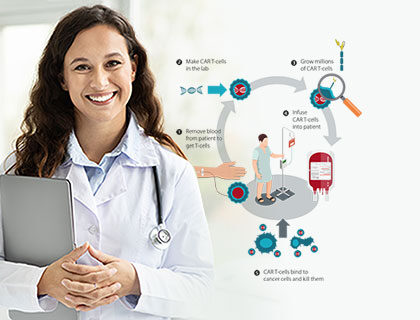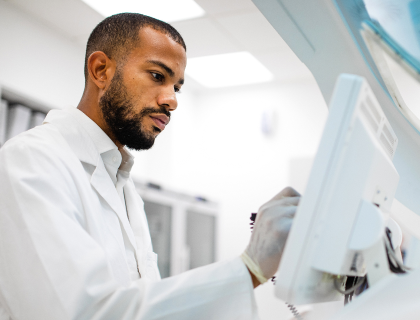CAR T-Cell Therapy: Revolutionizing Blood Cancer Treatment

Posted by:
Dr. Dr. med. R. Kah
Published on:
Jul 22, 2024
CAR T-cell therapy is a groundbreaking treatment primarily used for certain types of blood cancers. This innovative approach is making significant strides in the medical field, offering hope to patients with challenging diagnoses. Let's delve into the types of cancers that can be treated with CAR T-cell therapy and understand its profound impact.
Acute Lymphoblastic Leukemia (ALL)
Acute Lymphoblastic Leukemia (ALL) is a type of blood cancer that occurs more frequently in children. It involves the overproduction of immature lymphocytes, a type of white blood cell, in the bone marrow. Patients with ALL often experience symptoms such as fatigue and weakness, bleeding without a significant cause, bruising, fever, infections, and frequent bone and joint pain.
Non-Hodgkin Lymphomas (NHL)
Non-Hodgkin Lymphomas (NHL) are a diverse group of blood cancers that affect the lymphatic system. These cancers originate in the lymphocytes, another type of white blood cell that plays a crucial role in the immune system. Symptoms of NHL include swelling of the lymph nodes, particularly in the neck, armpit, and groin, night sweats, significant weight loss, fever, fatigue, and skin rashes.
Multiple Myeloma
Multiple Myeloma is a cancer that affects plasma cells in the bone marrow and is classified as a type of lymphoma. Plasma cells are responsible for producing antibodies, and their malignant transformation disrupts normal blood cell production. Symptoms of multiple myeloma include fatigue and weakness, sudden infections, general fatigue and weakness, bone pain, kidney problems, and a noticeable decrease in erythrocytes (red blood cells).
The Potential of CAR T-cell Therapy
CAR T-cell therapy is considered for patients whose cancer cells have specific characteristics that make treatment with CAR T-cells feasible. This therapy involves modifying a patient's T-cells to target and destroy cancer cells, offering a personalized approach to treatment. While not all types of cancer are suitable for this therapy, the success rates are highly encouraging. Numerous research groups worldwide are working on developing further clinical applications for CAR T-cell therapy, aiming to expand its use and efficacy.
The success of CAR T-cell therapy has been impressive, with initial clinical remission rates as high as 90%. However, it is currently only used for a small number of patients because the process is complex and time-consuming. A fully automated process could safely treat many more patients, potentially transforming cancer care on a larger scale. We are actively working with leading companies to find suitable solutions and make this revolutionary therapy more accessible.
Stay tuned for the next part of our blog series, where we will explore the different side effects of CAR T-cell therapy. Together, we can continue to advance the field of cancer treatment and bring hope to countless patients.

What exactly is CAR T-Cell Therapy?
CAR T-cell therapy is a form of immunotherapy against cancer in which the patient's own T-cells are genetically modified in the laboratory to recognise and attack cancer cells. The therapy aims to modify the immune system.

Inside CAR T-Cell Therapy: Progress and Pitfalls
CAR T-cell therapy has revolutionized treatment of hematological malignancies, driving the enormous growth in CAR T-cell research. But while results are highly encouraging, the treatment involves multiple complex steps.

How Viral Vectors Drive CAR T-Cell Therapy
Viral vectors are essential for CAR T-cell therapy:
Viral vectors are at the heart of this cutting-edge technology and deliver the genetic information needed to turn T-cells into effective cancer killers.

CAR T-Cell Therapy: The Next Frontier
What started as a groundbreaking treatment for certain types of leukemia, lymphoma, and multiple myeloma is now laying the foundation for a new era of personalized medicine.
